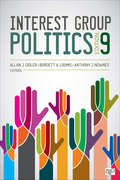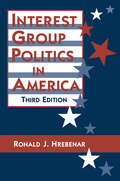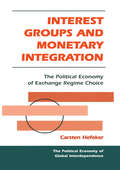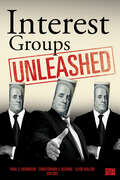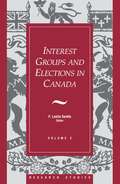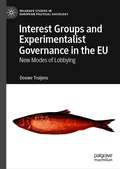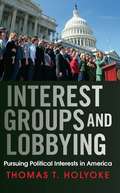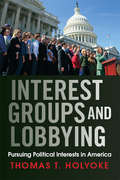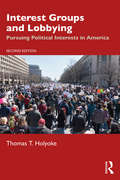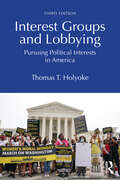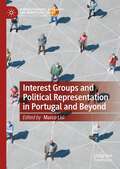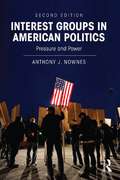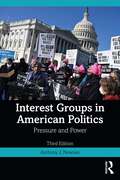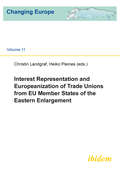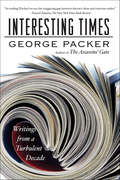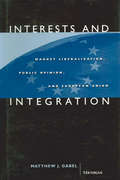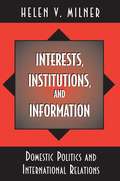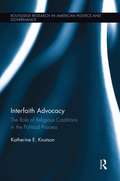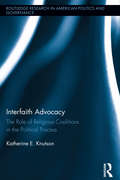- Table View
- List View
Interest Group Politics
by Allan J. Cigler Burdett A. Loomis Anthony J. NownesWith its broad spectrum of scholarship on interest groups past and present, Interest Group Politics brings together noted political scientists to provide comprehensive coverage and cutting-edge research on the role and impact of interest groups in U.S. politics, all geared to an undergraduate audience. In the wake of the Citizens United decision and the growth of lobbying into a multi-billion dollar industry, this trusted classic provides students with a guide to the influence and reach of interest groups.
Interest Group Politics
by Allan J. Cigler Burdett A. Loomis Anthony J. NownesWith its broad spectrum of scholarship on interest groups past and present, Interest Group Politics brings together noted political scientists to provide comprehensive coverage and cutting-edge research on the role and impact of interest groups in U.S. politics, all geared to an undergraduate audience. In the wake of the Citizens United decision and the growth of lobbying into a multi-billion dollar industry, this trusted classic provides students with a guide to the influence and reach of interest groups.
Interest Group Politics in America
by Ronald J. Hrebenar Ruth K. ScottInterest-group lobbying is a controversial activity in American politics and this book provides a study of group power. This edition includes expanded coverage of the changing dynamics of power politics in America; new media venues and grassroots organizing; and the perennial issue of reform.
Interest Groups And Monetary Integration: The Political Economy Of Exchange Regime Choice
by Carsten HefekerThe currency question, Disreali is reported to have said, has made even more persons mad than love. A quantitative test of the accuracy of this comparison is, in the present deplorable state of medical statistics, scarcely possible, But Disraeli may well have been right.
Interest Groups Unleashed
by Paul S. Herrnson, Christopher J. Deering, Clyde WilcoxNew scholarship for a new paradigm in interest groups politics… The 2010 campaign and election was pivotal: the Republican takeover of the House, the advent of "super PACs," and record-breaking sums spent on a midterm election. More than ever before, interest groups were able to mobilize new resources and new technologies in a shifting set of House and Senate races. This timely volume explores—in a series of lively case studies—a cross-section of groups, communities, and networks that vividly illustrates the "unleashing" of interest group activity in the electoral process in response to Citizens United and other court cases and events.
Interest Groups and Elections in Canada: Volume 2
by F. Leslie SeidleThe two studies in Interest Groups and Elections in Canada explore the nature and influence of special interest groups. They consider different aspects of the question, "In the context of the Canadian Charter of Rights and Freedoms, how can the laws intended to secure a fair electoral process be reconciled with freedom of expression?" Janet Hiebert reviews the limits on interest groups adopted in 1974 and amended in 1983, profiles the groups involved int he 1988 federal election, and discusses relevant legislation and jurisprudence in the provinces and abroad. She concludes that spending limits for parties and candidates will only be effective if there are also restrictions on independent expenditures during elections by groups and individuals. Brian Tanguay and Barry Kay assess the influence attributed to locally oriented interest groups, including by members of Parliament, and conclude that these organizations have less influence on the political process than is the popular view. The authors conclude that dissatisfaction is a key variable explaining the role of these interest groups and their activities during elections.
Interest Groups and Experimentalist Governance in the EU: New Modes of Lobbying (Palgrave Studies in European Political Sociology)
by Douwe TruijensThis book researches the role that interest groups play in new modes of EU governance, with a specific focus on the role of interest representation in experimentalist governance frameworks. The research asks how lobbying in the legislative process contributes to the governance framework and its institutional arrangements and subsequently asks how the relevant interest groups participate in policy implementation – in which broad policy goals are concretised. The research is based on four in-depth case studies: the Industrial Emissions Directive, the General Data Protection Regulation, the Combating Child Abuse Directive, and the Institutions for Occupational Retirement Provision Directive. Of special interest in these cases are the balance between types of interest groups (most notably business and NGOs) in policy formulation and implementation, and the changing dynamics between interest groups and public policy-makers in such ‘horizontal’ governance. The book’s findings are required reading for all those concerned with effective and democratic policy-making in the EU.
Interest Groups and Lobbying
by Thomas T. HolyokeInterest groups and lobbyists play a crucial role in how public policy is made in the United States' representative democracy. By helping citizens organize and pursue their self-interests in the political arena, interest groups and lobbyists are an alternative but very effective form of representation. However, the adversarial nature of interest groups often fuels voter discomfort with the political process. Interest Groups and Lobbying is an accessible and comprehensive text that examines the crux of this conflict. Pulling together two areas of interest group research-why advocacy organizations form and how they are able to gain influence in Washington, DC-Thomas T. Holyoke shows students the inner workings of interest groups in the United States. Using case studies to clarify and expand on the issues surrounding lobbying and group action in federal, state, and local government, Holyoke explores how we can use interest groups and their adversarial impulse to achieve the greatest good for the greatest number of people.
Interest Groups and Lobbying
by Thomas T. HolyokeInterest groups and lobbyists play a crucial role in how public policy is made in the United States’ representative democracy. By helping citizens organize and pursue their self-interests in the political arena, interest groups and lobbyists are an alternative but very effective form of representation. However, the adversarial nature of interest groups often fuels voter discomfort with the political process. Interest Groups and Lobbying is an accessible and comprehensive text that examines the crux of this conflict. Pulling together two areas of interest group research--why advocacy organizations form and how they are able to gain influence in Washington, DC--Thomas T. Holyoke shows students the inner workings of interest groups in the United States. Using case studies to clarify and expand on the issues surrounding lobbying and group action in federal, state, and local government, Holyoke explores how we can use interest groups and their adversarial impulse to achieve the greatest good for the greatest number of people.
Interest Groups and Lobbying: Pursuing Political Interests in America
by Thomas T. HolyokeInterest groups and lobbyists play a crucial role in how public policy is made in the United States' representative democracy. By helping citizens organize and pursue their self-interests in the political arena, interest groups and lobbyists are an alternative but very effective form of representation. However, the adversarial nature of interest groups often fuels voter discomfort with the political process. Interest Groups and Lobbying is an accessible and comprehensive text that examines the crux of this conflict. Pulling together two areas of interest group research (why advocacy organizations form and how they are able to gain influence in Washington) DC. Thomas T. Holyoke shows students the inner workings of interest groups in the United States. Using case studies to clarify and expand on the issues surrounding lobbying and group action in federal, state, and local government, Holyoke explores how we can use interest groups and their adversarial impulse to achieve the greatest good for the greatest number of people.
Interest Groups and Lobbying: Pursuing Political Interests in America
by Thomas T. HolyokeInterest Groups and Lobbying shows how political organizations and their lobbyists play a crucial role in how policy is made in the United States. It cuts through the myths and misconceptions about interest groups and lobbyists with an accessible and comprehensive text supported by real world examples and the latest research. New to the Second Edition • Fully updates and expands the discussion of social media and other online activity engaged in by interest groups, showing that they have become more sophisticated in their use of the internet – especially social media – for keeping current members informed and for their advocacy work. • New case studies on more recent advocacy efforts. • Updated data used in the book, including: • Total number and types of interest groups lobbying in Washington, DC • Total number and types of interest groups lobbying in the fifty states • Data on campaign contributions • Data on amicus briefs and case sponsorship • Data on stages of the lawmaking process where interest groups appear to lobby the most • New data on revolving-door lobbyists
Interest Groups and Lobbying: Pursuing Political Interests in America
by Thomas T. HolyokeInterest Groups and Lobbying shows how political organizations and their lobbyists play a crucial role in how policy is made in the United States. It cuts through the myths and misconceptions about interest groups and lobbyists with an accessible and comprehensive text supported by real-world examples and the latest research.New to the Third Edition Further updates and expands the discussion of social media and other online activity engaged in by interest groups, showing that they have become more sophisticated in their use of the internet – especially social media – for keeping current members informed and for their advocacy work. New case studies on more recent advocacy efforts. Updated data used in the book, including: Data on the ideological distribution of Washington interest groups Total number and types of interest groups lobbying in the 50 states Data on campaign contributions Data on amicus briefs and case sponsorship New discussion on the ethical and public interest obligations of lobbyists.
Interest Groups and Political Representation in Portugal and Beyond (Interest Groups, Advocacy and Democracy Series)
by Marco LisiThis book examines the characteristics and evolution of interest groups in Portugal. Drawing from a wide array of sources - including surveys, parliamentary activities, media coverage and interviews with MPs and lobbyists – it systematically assesses interest group politics. The book analyses the main features of group population, the strategies utilised by organised interests, their interactions with key decision-makers, and citizens’ opinions regarding their role in the political system. The original data provided in this book frames the Portuguese case in a broader European context, and will be extremely useful for international comparisons. It will appeal to scholars and students of European politics, interest groups, democratic theories, and public policy.
Interest Groups in American Politics: Pressure and Power
by Anthony J. NownesAmericans rail against so-called special interests but at the same time many members of society are themselves represented in one form or another by organized groups trying to affect the policymaking progress. This concise but thorough text demonstrates that interest groups are involved in the political system at all levels of government – federal, state, and local – and in all aspects of political activity, from election campaigns to agenda setting to lawmaking to policy implementation. Rather than an anomaly or distortion of the political system, it is a normal and healthy function of a pluralist society and democratic governance. Nonetheless, Nownes warns of the dangers of unwatched interest group activity, especially in the realms of the electoral process and issue advocacy. Interest Groups in American Politics, Second Edition, is grounded by the role of information in interest group activity, a theme that runs through the entire book. This much anticipated revision of Nownes’s text retains a student friendly tone and thoroughly updates the references to interest group research, as well as adds a new chapter on the connections between interest groups and political parties. Numerous figures and tables throughout the book help students visualize important trends and information.
Interest Groups in American Politics: Pressure and Power
by Anthony J. NownesAmericans regularly rail against so-called “special interests.” Yet, many members of society are themselves represented in one form or another by organized groups trying to affect government decisions. Interest Groups in American Politics, Third Edition, is grounded by the role of information in interest group activity, a theme that runs through the book. This concise, thorough text demonstrates that interest groups are involved in the political system at all levels of government—federal, state, and local—and in all aspects of political activity, from election campaigns to agenda setting to lawmaking and policy implementation. Rather than an anomaly or distortion of the political system, interest group activity is a normal and healthy function of a pluralist society and democratic governance. Nonetheless, Nownes warns of the dangers of unwatched interest group activity, especially in the realms of the electoral process and issue advocacy. This much-anticipated third edition of Nownes’s text retains a student-friendly tone. It thoroughly updates the references to interest group research, social media activity, new foreign actors in American politics, and political action committee (PAC) and party connections. Numerous figures and tables throughout the book help students visualize significant trends and information. New to the Third Edition A new section in Chapter 1 (Interest Groups in the United States) on social movements in the US. A new section in Chapter 4 (The Non-Lobbying Activities of Interest Groups) on how interest groups use social media to recruit members and burnish their image. A new section in Chapter 5 (Direct Lobbying) about lobbying regulation, how it affects group behavior, and "shadow interests." New data in Chapter 6 (Electoral Lobbying) on how and how much groups spend on PACs, super PACs, and other vehicles for election spending. A new section in Chapter 7 (Indirect Lobbying) on how interest groups use social media and new technology to affect political outcomes. A new section in Chapter 8 (Interest Groups and Political Parties) on interest groups, the Republican Party, and President Donald Trump. New information in Chapter 9 (The Influence of Interest Groups) on the latest research on interest group power and influence. The new section will cite the latest literature on the growing power of business.
Interest Rate Elasticity of Residential Housing Prices
by Martin Čihák Plamen Iossifov Amar ShanghaviA report from the International Monetary Fund.
Interest Representation and Europeanization of Trade Unions from EU Member States of the Eastern Enlargement
by Christin Landgraf Heiko PleinesThis book examines the integration of major trade unions from the six biggest countries of EU's Eastern enlargement into EU governance structures. Based on extensive empirical research, including more than 150 in-depth interviews, comprehensive data, document research, and eight detailed case studies, the contributions describe the activities and perceptions of the trade unions under investigation and the different levels of engagement, including European umbrella organizations, interregional cooperation, and European Works Councils. The book thus contributes to political science research on interest representation and Europeanization as well as sociological research on labor relations.
Interest Representation and Europeanization of Trade Unions from EU Member States of the Eastern Enlargement (Changing Europe #11)
by Christin Landgraf Heiko PleinesThis book examines the integration of trade unions from the six biggest countries of the EU's Eastern enlargement of EU governance structures. Based on more than 150 in-depth interviews, comprehensive data, document research, and eight detailed case studies, contributions describe the activities and perceptions of the trade unions under investigation and different levels of engagement, including European umbrella organizations, interregional cooperation, and European Works Councils. The book contributes to political science research on interest representation and Europeanization, as well as sociological research on labor relations.
Interesting Times: Writings from a Turbulent Decade
by George PackerThe 2013 National Book Award WinnerA New York Times BestsellerThroughout his career as a journalist, George Packer has always been attuned to the voices and stories of individuals caught up in the big ideas and events of contemporary history. Interesting Times unites brilliant investigative pieces such as "Betrayed," about Iraqi interpreters, with personal essays and detailed narratives of travels through war zones and failed states. Spanning a decade that includes the September 11, 2001 attacks and the election of Barack Obama, Packer brings insight and passion to his accounts of the war on terror, Iraq, political writers, and the 2008 election. Across these varied subjects a few key themes recur: the temptations and dangers of idealism; the moral complexities of war and politics; the American capacity for self-blinding and self-renewal.Whether exploring American policies in the wake of September 11, tracking a used T-shirt from New York to Uganda, or describing the ambivalent response in Appalachia to Obama, these essays hold a mirror up to our own troubled times and showcase Packer's unmistakable perspective, which is at once both wide-angled and humane.
Interests and Integration: Market Liberalization, Public Opinion, and European Union
by Matthew J. GabelIntegration in Europe has been a slow incremental process focusing largely on economic matters. Policy makers have tried to develop greater support for the European Union by such steps as creating pan-European political institutions. Yet significant opposition remains to policies such as the creation of a single currency. What explains continued support for the European Union as well as opposition among some to the loss of national control on some questions? Has the incremental process of integration and the development of institutions and symbols of a united Europe transformed public attitudes towards the European Union? In this book, Matthew Gabel probes the attitudes of the citizens of Europe toward the European Union. He argues that differences in attitudes toward integration are grounded in the different perceptions of how economic integration will affect individuals' economic welfare and how perceptions of economic welfare effect political attitudes. Basing his argument on Easton's idea that where affective support for institutions is low, citizens will base their support for institutions on their utilitarian appraisal of how well the institutions work for them, Gabel contends that in the European Union, citizens' appraisal of the impact of the Union on their individual welfare is crucial because their affective support is quite low. This book will be of interest to scholars studying European integration as well as scholars interested in the impact of public opinion on economic policymaking.
Interests, Institutions, and Information: Domestic Politics and International Relations
by Helen V. MilnerIncreasingly scholars of international relations are rallying around the idea that "domestic politics matters." Few, however, have articulated precisely how or why it matters. In this significant book, Helen Milner lays out the first fully developed theory of domestic politics, showing exactly how domestic politics affects international outcomes. In developing this rational-choice theory, Milner argues that any explanation that treats states as unitary actors is ultimately misleading. She describes all states as polyarchic, where decision-making power is shared between two or more actors (such as a legislature and an executive). Milner constructs a new model based on two-level game theory, reflecting the political activity at both the domestic and international levels. She illustrates this model by taking up the critical question of cooperation among nations. Milner examines the central factors that influence the strategic game of domestic politics. She shows that it is the outcome of this internal game--not fears of other countries' relative gains or the likelihood of cheating--that ultimately shapes how the international game is played out and therefore the extent of cooperative endeavors. The interaction of the domestic actors' preferences, given their political institutions and levels of information, defines when international cooperation is possible and what its terms will be. Several test cases examine how this argument explains the phases of a cooperative attempt: the initiation, the negotiations at the international level, and the eventual domestic ratification. The book reaches the surprising conclusion that theorists--neo-Institutionalists and Realists alike--have overestimated the likelihood of cooperation among states.
Interface
by Stephen BuryA near-future thriller in which a shadowy coalition bent on controlling the world economy attempts to manipulate the president of the United States through the use of a computer bio-chip implanted in his brain.
Interface between English Language Education Policies and Practice: Examples from Various Contexts
by Eric Enongene Ekembe Lauren Harvey Eric DwyerThis book is about the policy-practice praxis in English language education, and draws on research from a diverse range of under-explored international settings to showcase the importance of contextual realities on how policy and practice interact. The case studies covered in the volume come from five continents (Africa, Europe, Asia, and South and North America) and cover 11 countries in total. The authors cover a wide range of themes and identify a number of issues at the interface between policy and practice. In some cases they also highlight local initiatives for navigating these issues, providing contextually-grounded guidance and experience which will be of use to teachers and teacher trainers in other settings. This book will be of interest to policy makers, EMI researchers, ELT practitioners, teacher trainers and trainees, and the broader Applied Linguistics research community.
Interfaith Advocacy: The Role of Religious Coalitions in the Political Process
by Katherine E. KnutsonUsing the historic Minnesota state government shutdown of 2011 as a backdrop, Interfaith Advocacy describes the work of the Joint Religious Legislative Coalition, an interfaith advocacy group that brings together leaders from Catholic, Protestant, Jewish, and Muslim traditions to advocate on behalf of a range of policies. As the nation's first statewide interfaith lobbying group, the story of the JRLC facilitates an examination of the role of political advocacy groups in state level American politics: what they are, how and why they form, how they mobilize citizens to participate in the political process, how they work to influence government, and what their impact is on American democracy. With research based on two years of in-depth interviews, participant observation, and analysis of archival records, this volume offers proof that it is possible to build successful long term political coalitions among improbable allies. The book investigates both the strengths and weaknesses of this model of advocacy and concludes that the presence of religious advocacy groups in the political process offers substantial benefits of representation, concern for underrepresented issues and groups, and the development of networks of social capital. Interfaith Advocacy is grounded in the theoretical literature of political science but also accessible to all readers who have an interest in political advocacy, state politics, or religion and politics.
Interfaith Advocacy: The Role of Religious Coalitions in the Political Process (Routledge Research in American Politics and Governance)
by Katherine E. KnutsonUsing the historic Minnesota state government shutdown of 2011 as a backdrop, Interfaith Advocacy describes the work of the Joint Religious Legislative Coalition, an interfaith advocacy group that brings together leaders from Catholic, Protestant, Jewish, and Muslim traditions to advocate on behalf of a range of policies. As the nation’s first statewide interfaith lobbying group, the story of the JRLC facilitates an examination of the role of political advocacy groups in state level American politics: what they are, how and why they form, how they mobilize citizens to participate in the political process, how they work to influence government, and what their impact is on American democracy. With research based on two years of in-depth interviews, participant observation, and analysis of archival records, this volume offers proof that it is possible to build successful long term political coalitions among improbable allies. The book investigates both the strengths and weaknesses of this model of advocacy and concludes that the presence of religious advocacy groups in the political process offers substantial benefits of representation, concern for underrepresented issues and groups, and the development of networks of social capital. Interfaith Advocacy is grounded in the theoretical literature of political science but also accessible to all readers who have an interest in political advocacy, state politics, or religion and politics.
